|
|
|
Sort Order |
|
|
|
Items / Page
|
|
|
|
|
|
|
| Srl | Item |
| 1 |
ID:
192912
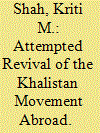

|
|
|
|
|
| Summary/Abstract |
The paper looks at the Khalistan movement, amidst the recent hunt
and arrest of radical preacher Amritpal Singh. It studies how the
movement has changed since the campaign for a sovereign Sikh state
went global in the 1970s; and what the demand for Khalistan entails
today. It studies the role the Sikh diaspora in the United Kingdom,
Canada, Australia and the United States has played; and how recent
events, particularly, protests at Indian High Commissions in these
countries reflects the ambivalence of India’s ‘allies’ towards the
separatists. The paper argues that while the nature of the threat posed
by Khalistani separatists is much milder today than it was decades
ago, the challenge for the Indian government will be the influence
of the Sikh diaspora on foreign politicians and New Delhi’s ability to
discredit the movement abroad.
|
|
|
|
|
|
|
|
|
|
|
|
|
|
|
|
| 2 |
ID:
192910


|
|
|
|
|
| Summary/Abstract |
India is standing at an exciting cusp of its political and economic development.
Its international clout has grown in proportion to its development. India prides
itself on its strategic autonomy and pursuance of multipolarity in foreign
affairs. Between May 19-24, 2023, Prime Minister Narendra Modi visited
Japan, Papua New Guinea and Australia. He was invited to attend the G7
meeting, held in Hiroshima. Alongside it, he had bilateral meetings with Prime
Minister Fumio Kishido of Japan, and also attended a summit of the QUAD
together with President Joe Biden of USA, Prime Minister Anthony Albanese
of Australia, and Prime Minister Kishido of Japan. From there he headed to
Papua New Guinea (PNG) - heralding India’s foray into the Pacific and
Oceania. In Australia, he had a summit meeting with Prime Minister Albanese.
Modi will be travelling to the US as a state guest of President Joe Biden, an
honour last accorded to then Prime Minister Manmohan Singh in 2009. Later,
in July India will host the Shanghai Cooperation Organisation (SCO) summit
of heads of state – albeit in virtual format – as the 2023 Chair; thereafter, the
prime minister will travel to Paris to attend France’s Bastille Day as the Guest
of Honour. India will host the G20 summit in September. Later in the year the
Prime Minister will also be attending the BRICS summit meeting in South
Africa.
|
|
|
|
|
|
|
|
|
|
|
|
|
|
|
|
| 3 |
ID:
192907
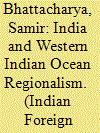

|
|
|
|
|
| Summary/Abstract |
With the world system moving from a bipolar to a multipolar structure,
and the world agenda shifting from narrow high-politics to lowpolitics, there is a need to critically examine the impact of emerging
countries on regionalism and the regional systems of the Global South.
Uplifted by its economic growth, India is exerting to play a more
active role beyond its immediate neighbourhood by developing critical
partnerships with regional and extra-regional players. As a result of
India’s expanding ties with the Vanilla Island countries, India has
recently been accepted as an observer in the Indian Ocean
Commission. While France has traditionally dominated this region
due to its shared history, China has also been increasingly asserting
its position here. Against the backdrop of Chinese presence continuing
to shore up as well as the mounting tension between the USA and
Iran over the Mozambique Channel, the competition between these
powers could spill over into the region and impact the peace, stability,
and ongoing constructive cooperation efforts. This essay takes India
as a case study, and attempts to determine the impact of India’s
assertive policies in the region. By examining the theoretical constructs
of regionalism, the paper examines the impact of India’s increasing
assertiveness in the region, and its impact on WIO regionalism at a
theoretical as well as empirical level.
|
|
|
|
|
|
|
|
|
|
|
|
|
|
|
|
| 4 |
ID:
192915
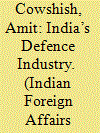

|
|
|
|
|
| Summary/Abstract |
Speaking at the Defence Institute of Advanced Technology (DIAT), Pune,
on May 15, 2023, Defence Minister Rajnath Singh emphasised the urgency
of achieving self-reliance in defence production as continued dependence
on the import of military equipment was affecting the country’s strategic
autonomy. ‘It can’, he added, ‘be a cause for concern for us if our adversary
possesses more advanced technologies’. He was alluding to the potential
threat emanating from indisputable superiority of China in military
technology.
|
|
|
|
|
|
|
|
|
|
|
|
|
|
|
|
| 5 |
ID:
192913


|
|
|
|
|
| Summary/Abstract |
In the two decades following the devastating Tsunami of 2004, India has
emerged as a global leader not just in having a well-defined structure for
mitigating disasters but also in providing humanitarian support to other
countries affected by disasters. The Hyogo Framework for Action (HFA)
(2005–2010) brought vulnerable communities in disaster zones into key
focus of decision making; it also emphasized preparedness (resilience
building to enable communities to bounce back faster) as an important
area of state responsibility. The Sendai Framework (2015–2030) that
followed Hyogo evolved further by indicating that ‘risk identification’
helps timely action. As disasters observe no political boundaries, so
disaster management strives to overcome every political and ideological
division to cooperate, collaborate, and hand hold affected nations.
Resilience building includes a strategy to prevent other nations from
succumbing to disasters its impact is never confined to the one victim
nation alone but spreads to other nations in different ways
|
|
|
|
|
|
|
|
|
|
|
|
|
|
|
|
| 6 |
ID:
192914
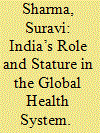

|
|
|
|
|
| Summary/Abstract |
Pandemic recast India’s healthcare system; and within a short span of time
catalyzed changes in its fragmented infrastructure and workflows. The Covid19 pandemic time demands on the health systems worldwide had catapulted
the country into the global scenario reiterating its status as an aspirant of
global pharmacy status and hub of healthcare expertise. India’s proficiency in
the field has been reflected for years in the inflow of medical tourists to
India’s renowned private sector hospitals and few in the public sector and
outflow of medical workforce, including doctors and nurses to the developed
world. The Covid-19 pandemic has exposed the glaring shortages of trained
medical workforce in the developed world, offering an opportunity for India
to fill the gap. India’s timely medical assistance to several countries during
the peak of the pandemic has reinforced its soft power, besides enhancing its
credentials as an important global player in health sector. The pandemic has
underlined the importance of adopting modern and advanced tools such as
information technology, digital platforms in health sector. There is now a
growing realization about the importance of Public Private Partnerships (PPP)
in the health sector. The issues which are of global dimension in health sector
include sustained supply chains particularly during the global disasters,
international cooperation, global health security, strengthening health systems,
inequities, role of World Health Organization (WHO) etc. Can India derive
strategic benefits in expanding Global Health Diplomacy?
|
|
|
|
|
|
|
|
|
|
|
|
|
|
|
|
| 7 |
ID:
192908
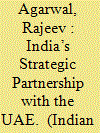

|
|
|
|
|
| Summary/Abstract |
Home away from Home” is how PM Narendra Modi described the UAE
while addressing Indian diaspora at Dubai during his visit to UAE in February
20181
. Earlier, former External Affairs Minister Late Mrs Sushma Swaraj
called India as the “Janm Bhoomi” and the Gulf region as the “Karm Bhoomi”
for almost nine million Indians2
, while addressing the inaugural session of the
First India-League of Arab States Media Symposium at Delhi in August 2014,
hailing the Indian diaspora for their hard work and the goodwill that they are
generating through work in the region.
|
|
|
|
|
|
|
|
|
|
|
|
|
|
|
|
| 8 |
ID:
192909


|
|
|
|
|
| Summary/Abstract |
The India-Japan mutuality has been acquiring steady salience through the 21st
century, exuded in no small measure in the telegenic flourish of the
nomenclatures, connoting engagement.1
Since late Prime Minister Abe Shinzo’s
clairvoyant averment of the ‘Confluence-of-the-Two-Seas’ schema in 2007,2
through to incumbent Prime Minister Kishida Fumio’s recent seminal unveiling
of the Indo-Pacific Vision, the purposeful choice of India as a venue for such
defining articulations, is emblematic of Tokyo’s convictions about New Delhi
as the veritable ‘indispensable partner’ across the trans-regional straddle, and
in its extremities.3 However, whilst iconic infrastructure-built projects embody
resplendent mutual equations, the visage of India-Japan cooperation and
convergence across third countries, and extant sub-regions, remains heady
in promise and teeming with possibilities; yet, in reality, is only incremental,
and substantively underwhelming in performance. This ‘expectationsoutcomes’ disconnect is all the more galling when contextualised in both the
protagonists’ deeply shared apprehensions over the coercive and predatory
dimensions of Chinese strategic ascendancy. Both countries have espoused
the need for a plural rules-based maritime order, and the chaperoning of a
mercantilist and infrastructure development edifice which is anchored-in
political transparency, financial rectitude, social consultation, and ecologically
congruent actions, in the Indo-Pacific.4
|
|
|
|
|
|
|
|
|
|
|
|
|
|
|
|
| 9 |
ID:
192911
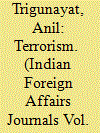

|
|
|
|
|
| Summary/Abstract |
9/11 and the demolition of the World Trade Centre — the icon and emblem of
the liberal world — by Al Qaeda terrorists has been etched in the memories
of the world. Until then, the West did not think of terrorism as a significant
threat as they were barely dealing with it on their home turf. Countries like
India had suffered from cross border terrorism, extremism, and insurgency
from Pakistan based terrorists, engineered and nurtured by the Pakistani deep
state, for over two decades already. Geo politics was a convenient tool to
overlook the nexus of state and non-state actors, and they were selectively
used by big powers. This is well documented in the growth of the Mujahideen
and the Taliban. This nonchalance proved to be a disaster and demonic in
times to come. Only proforma concerns were expressed before 9/11, with
occasional intelligence exchanges with friendly countries. Terrorism, or the
fight against it, was a fashionable choice and not an existential problem. In
fact, many a time it was even justified on certain grounds, and implied goals
or a sympathetic view was taken. Zero tolerance of terrorism was an alien
concept — at least in practice.
|
|
|
|
|
|
|
|
|
|
|
|
|
|
|
|
|
|
|
|
|